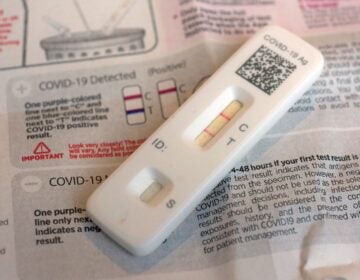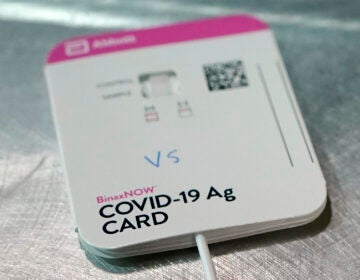Coronavirus update: 200,000+ unemployment claims as joblessness surges in Southeastern Pa.
New statistics from the Pennsylvania Department of Labor and Industry shows hundreds of thousands of unemployment claims have been filed in Southeastern Pennsylvania.
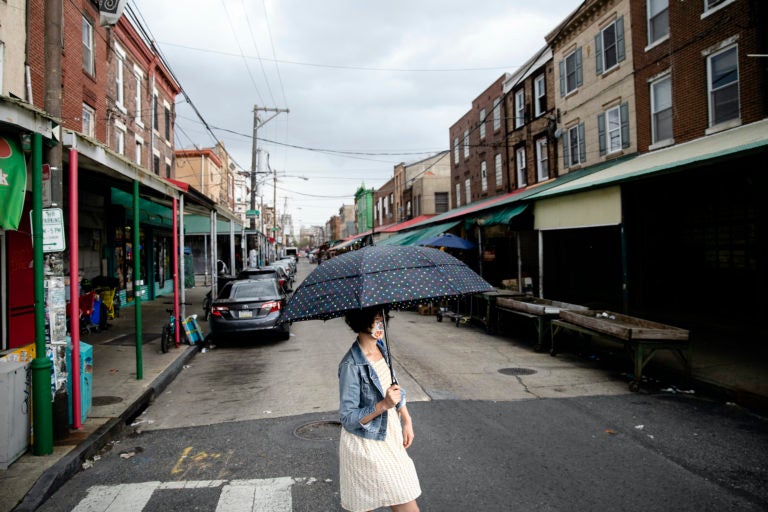
A shopper wearing a face mask to protect against the spread of the new coronavirus crosses South 9th Street in the Italian Market neighborhood of Philadelphia, Thursday, April 9, 2020. (AP Photo/Matt Rourke)
Updated 6:30 p.m.
–
Are you on the front lines of the coronavirus? Help us report on the pandemic.
As of Friday, there are 20,251 confirmed COVID-19 cases in Pennsylvania, 54,588 in New Jersey, and 1,326 cases in Delaware. Philadelphia has 5,271 cases.
Pennsylvania’s death toll stands at 416, New Jersey’s at 1,932, and Delaware’s at 32. Philadelphia’s death toll is now 110.
200,000+ unemployment claims as joblessness surges in Southeastern Pa.
New statistics from the Pennsylvania Department of Labor and Industry shows hundreds of thousands of unemployment claims have been filed in Southeastern Pennsylvania, an area ravaged by the COVID-19 contagion.
The state has confirmed that nearly 200,000 unemployment claims have been filed in the five-county region — Philadelphia, Montgomery, Bucks, Delaware and Chester counties — between March 22 and April 4, the most recent data available.
That’s “worse than where [Southeastern Pennsylvania] was during the worst of the Great Recession,” said Jeff Hornstein, executive director of the Economy League of Greater Philadelphia. “This represents a whole lot of pain for workers and a huge hit to economic activity and municipal government revenues.”
However, these figures likely vastly understate the extent of unemployment in the region. The state was unable to confirm the originating location for nearly 500,000 of the 1.3 million Pennsylvania residents that filed for unemployment compensation during the same period of time.
Another 43,000 individuals filed for unemployment from out-of-state residences.
While many of the state’s unemployment claims were filed in major population centers, like the Philadelphia and Pittsburgh metropolitan regions, many smaller Appalachian counties saw worse rates of joblessness per capita.
Elk County, for example, saw more than 4,700 claims filed out of a total population of just 30,000 — meaning nearly 15% of all residents filed claims. Philadelphia, for comparison saw 83,000 claims filed out of a population of 1.58 million residents, or about 5% of all residents.
Wolf announces nearly half billion in emergency loans for Pa. hospitals
As Pennsylvania again marked it’s worst day for COVID-19 cases — with 2,023 new diagnoses — Gov. Tom Wolf announced a $450 million fund to provide emergency loans to the state’s financially struggling hospitals.
The “Hospital Emergency Loan Program” would provide nearly half a billion in low-interest loans to provide “immediate working capital” for hospitals to continue operations, officials said.
Wolf said many hospitals had shifted resources in preparation for a COVID-19 surge, cancelling elective procedures, moving additional staff to emergency rooms or purchasing new equipment.
“All these efforts come at a cost,” Wolf said. “This means many hospitals have had a significant decline in revenue … We cannot allow any of our hospitals to become bankrupt.”
Each month, Pennsylvania hospitals are losing between $1.5 and $2 billion – that’s roughly 40% of their monthly revenue, according to Andy Carter, President and CEO of the Pennsylvania Hospital Association.
“This staggering amount of loss greatly overshadows anything we’ve experienced before,” said Carter.
He added that while he has no reason to believe treatment for COVID patients won’t be reimbursed by private or public insurers, the losses from canceled elective surgeries will far outweigh the money coming in.
More than 2,000 people are currently hospitalized across the state with COVID-19.
Although the pace of the virus’ spread appeared to be slowing in the Keystone State, Health Secretary Dr. Rachel Levine said the state had marked its second day with 78 deaths, the highest number recorded on record, for a total of 416.
Levine said she believed the growing tally was the result of patients who had been in long-term hospitalization beginning to succumb to the virus.
“I believe we are seeing an increase in the number deaths from patients who have been ill for a while and, tragically, are beginning to pass away,” she said.
Farley: Growth of COVID-19 cases in Philly “slowing”
Philadelphia Health Commissioner Dr. Thomas Farley said Philadelphia had seen its worst day yet for deaths linked to the COVID-19 contagion, with 33 new fatalities. The city also recorded 522 new confirmed cases of the virus, with 717 patients currently admitted to city hospitals due to infections.
However, the doctor added that the rate of increase in new cases seems to have abated in recent days.
“We’re seeing a slowing of the growth of coronavirus in the city,” Farley said.
Of the city’s deaths, 67% were nursing homes, and 65% were over the age of 70.
“Most people that die are particularly vulnerable,” he said. “However, there are some young people who got this virus and did not survive.”
In all, the city has recorded 5,793 COVID-19 cases to date and 137 deaths.
Mayor Jim Kenney acknowledged the upcoming Easter weekend. He urged adherents to call and pray for loved ones but, if possible, to keep their distance from family members.
“As Jesus rose from the dead, hopefully we can rise from this pandemic,” Kenney said.
City sees surge in business relief applicants; secures millions for arts
A small business relief program launched by the city of Philadelphia has received over 6,000 applications from businesses seeking more than $82 million in aid, almost seven times more than currently available funding permits.
The city in conjunction with PIDC, a government-affiliated economic development agency, have so far secured $12.1 million in relief funding, including nearly $3 million in recent donations from the Knight Foundation, Citizens Bank and PNC Bank. Officials said the fund would soon disburse awards to about 1,000 businesses.
However, the city is continuing to seek additional funding and will continue to accept applications until midnight on Wednesday, April 15.
Separately, Philadelphia’s Office of Arts, Culture and the Creative Economy, the Greater Philadelphia Cultural Alliance and the Philadelphia Cultural Fund announced a new relief effort for arts.
The “COVID-19 Arts Aid PHL” fund launched with $3.45 million in support, including a $2.5 million grant from the William Penn Foundation.
The new funding pool will support individual artists and small- or medium-sized cultural organizations with budgets of up to $15 million.
Gov. Wolf orders temporary early release for some non-violent prisoners
The governor of Pennsylvania ordered corrections officials to begin transferring certain non-violent prisoners at state facilities into early, supervised release to combat the spread of COVID-19.
The temporary early release program would apply only to non-violent inmates otherwise set for release within the next nine months –– or the next 12 months for those deemed “high risk” for coronavirus-related complications.
“I am pleased to direct the Department of Corrections to begin the process to release vulnerable and non-violent inmates at or nearing their release dates in an organized way that maintains supervision post-release and ensures home and health care plans are in place for all reentrants,” Wolf said in a Friday statement.
Prisoners would be moved from state correctional facilities into halfway houses or “home confinement” following a review. About 1,500 to 1,800 currently qualify for the program, with releases beginning as early as Tuesday, April 14. Individuals will be monitored similarly to parolees and will be supervised by parole agents.
Individuals would return to prison to complete their sentences after the order expires.
Corrections Secretary John Wetzel said he was supportive of the effort.
“Just as everyone in the community is dealing with COVID-19, the state prison system is doing the same,” he said. “We must reduce our inmate population to be able to manage this virus. Without this temporary program, we are risking the health, and potentially lives, of employees and inmates.”
Wolf cited powers granted to him under emergency management provisions in the Pennsylvania Constitution in ordering the early release, citing concerns the virus could rip through cramped prison facilities.
“We can reduce our non-violent prison population and leave fewer inmates at risk for contracting COVID-19 while maintaining public safety with this program,” Wolf said.
There have been 11 COVID-19 cases confirmed at State Correctional Institution Phoenix in Montgomery County, but concern for cases spreading to other facilities is another reason for the expedited release of eligible inmates.
‘Caravan’ to picket City Hall demanding more jail releases
Prisoners rights group Decarcerate PA and allied organizations will pack streets around City Hall with a “caravan” of cars to demand the release of more individuals in municipal jails.
“It is completely unacceptable that our Mayor and judges have not taken sufficient steps to release people quickly,” said Cara Tratner of the Philadelphia Community Bail Fund. “If they do not act now, these jails are going to become death camps.”
The protest is timed to take place during the Mayor’s daily press briefing. Cars will play amplified recordings of incarcerated individuals during the protest. Afterward, the caravan will continue on to the city’s jails, in Northeast Philadelphia.
As of Wednesday, there were 62 confirmed COVID cases in the county jails, not including staff.
WHYY’s Laura Benshoff also contributed reporting.
WHYY is your source for fact-based, in-depth journalism and information. As a nonprofit organization, we rely on financial support from readers like you. Please give today.


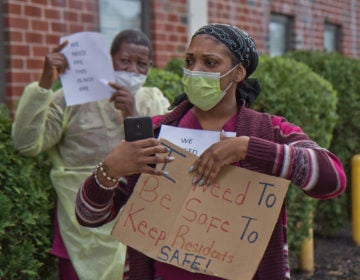
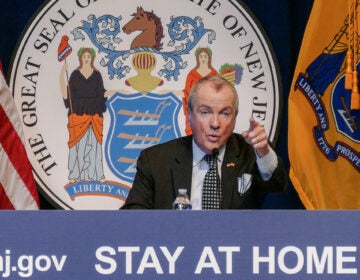
![CoronavirusPandemic_1024x512[1]](https://whyy.org/wp-content/uploads/2020/03/CoronavirusPandemic_1024x5121-300x150.jpg)

